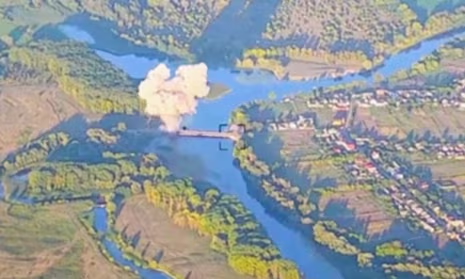Ukraine has announced the destruction of a second strategic bridge in a week as its offensive into Russia’s Kursk region progresses.
On Sunday, the Ukrainian military released aerial footage showing the attack on the bridge, which reportedly spans the Seym River in Zvannoe.
Shortly after, Ukrainian President Volodymyr Zelensky stated that the goals of the military operation in Kursk include establishing a “buffer zone” to prevent Russian attacks.
This marks nearly two weeks since Ukraine launched its most significant assault on Russian territory since Moscow’s invasion began in 2022.
“Minus one more bridge,” Ukrainian Air Force commander Lt. Gen. Mykola Oleschuk shared on social media, accompanied by footage of the strike.
He added, “The Ukrainian Air Force continues to hinder the enemy’s logistical capabilities with precise airstrikes, which is having a substantial impact on the conflict.”
The video depicts a large cloud of smoke enveloping the bridge, with one section visibly destroyed. The timing of the strike remains unclear.
Earlier this week, Ukraine destroyed another bridge over the river Seym, near the town of Glushkovo.
That bridge was used by the Kremlin to supply its troops.
Earlier, military analysts had identified three bridges in the area used by Russia to supply its forces, and they said two had either been destroyed or seriously damaged, Reuters news agency reported.
Almost two weeks after Ukrainian troops pushed across the border into Russia, it is becoming clear that they plan to stay.
President Zelensky said on Saturday his troops were strengthening positions in Kursk and expanding further in Russia.
On Sunday in an evening address, he said: “Our operation in the Kursk region is still inflicting losses on the Russian army and the Russian state, their defense industry, and their economy.”
He stated that “this is more than just defense for Ukraine” and said that the aim was to “destroy as much Russian war potential as possible and conduct maximum counteroffensive actions”.
This would include “creating a buffer zone on the aggressor’s territory”, he added, in an effort to prevent further Russian attacks into Ukraine.
Mykhaylo Podolyak, an adviser to President Zelensky, insisted Ukraine was not interested in occupying Russia but wanted to persuade Russia to enter negotiations.
Moscow has called the incursion a major provocation and vowed to retaliate with a “worthy response”.
As Ukraine moves further into western Russian territory, Russian forces are equally making gains in Ukraine’s east and have claimed a string of villages in recent weeks.
It comes as the head of the UN’s nuclear watchdog warned the nuclear safety situation at the Zaporizhzhia power plant in Russian-occupied Ukraine was deteriorating, following a drone strike near the site’s perimeter.
Rafael Grossi, head of the International Atomic Energy Agency (IAEA), said he remained “extremely concerned” and called for “maximum restraint from all sides” to protect the plant.
The agency said the impact of the strike was on a road just outside the facility – close to essential water sprinkler ponds and about 100m from the only remaining high-voltage line.
The plant was seized by Russia’s forces early in the war and has come under repeated attacks which both sides have blamed the other for.
Last week, Kyiv and Moscow traded blame after a fire broke out in one of the plant’s cooling towers.
The IAEA did not say who carried out Saturday’s strike, but its team stationed at Zaporizhzhia said the damage seemed to have been caused by a drone carrying an explosive.
“The team has heard frequent explosions, repetitive heavy machine gun and rifle fire and artillery at various distances from the plant,” the agency said in a statement.
The plant has not produced power in more than two years and all six reactors have been in cold shutdown since April.
Russia launched a full-scale invasion of its neighbour in February 2022 and has been making slow progress recently in seizing more territory in eastern Ukraine.
However, it was shocked when Ukrainian troops penetrated into its Kursk region where they have been consolidating positions for nearly two weeks.
Thousands of Russians have been evacuated from the area.
It is the first time foreign troops have been on Russian soil since World War Two.


